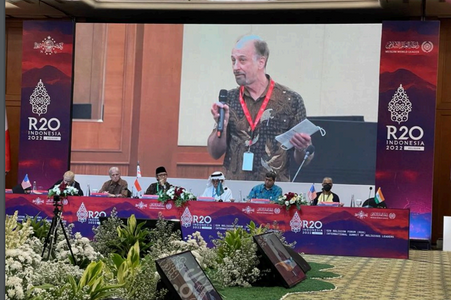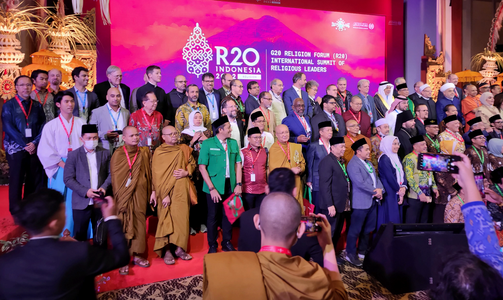Q&A with Prof. Bob Hefner
Robert Hefner is a professor in the Department of Anthropology and the Pardee School of Global Affairs. He specializes in the anthropology of religion, ethics and law, education and youth development, as well as the comparative study of gender, citizenship, globalization, and modernity.

Q: What is your connection with the Indonesian government?
A: Just about my entire adult life, I have worked conducting research in Indonesia. But over the past 10 years or so, I have had an especially close relationship with an organization known as “Nahdlatul Ulama” (NU), or the “renaissance of ulama.” NU was once a very conservative and traditionalist organization. But about 20 years ago, it began to change under the leadership of Abdurrahman Wahid, the former chairman of NU who went on to become president of Indonesia. Wahid was a close friend of mine. He represented a progressive, reform-minded, Gender-equity-affirming wing within NU. Wahid passed away in 2009, but his successor Yahya Staquf was very close to him and reached out to me to be on the Executive Board of the center that he created, called the Center for Global Civilizations. That’s a group that aims to show there is no “clash of civilizations,” and that what is needed today is cooperation across civilizations and nations.
Q: How did you get invited?
A: Under current government NU controls the directorship of the Ministry of Religious Affairs, which is a huge ministry as Indonesia is a multi-faith nation; 87% of its 275 million citizens are Muslim. The new minister is a person from NU who also knew that I served on the board of the Center for Global Civilization. He contacted me to participate in the Religion 20, which is now a formally recognized sub-group of the G20.

Q: Has there always been an R20?
A: The G20 has 8 sub-groups dealing with a variety of things, including women, economic development, and religion. The R20 concept – that is, establishing a religious subsection in the G20 – was an idea pioneered by Indonesia this year, after it assumed the role of host for the G20. As a result of Indonesia’s leadership this year, there will be an R20 at every G20 in the future. The premise of the R20 is not that all religious organizations are good. In the subgroup’s own words, the purpose of the organization is to “combat the instrumentalization of religion for identity, politics and political divisions” – and to transform religious organizations and peoples into agents for the global good.
Q: How was the R20 created?
A: The creation of such a religion-oriented body in the G20 has long been a dream of the government and religious organizations in Indonesia, and the idea over the last two years has been promoted in particular by the NU leadership. NU has around 70-90 million followers, which makes it the largest religiously-based social welfare organization in the world. NU leaders wanted to use this opportunity of Indonesia hosting the G20 to reach out to other religious organizations in the G20 to say wouldn’t this be good to have as a permanent sub-group. Their goal was to promote a pluralist and inclusive religious message, and to push back against extremism and violence in the name of religion.
Q: What was the conference like?
A: There were delegates from all faiths and all of the twenty countries in the G20, and of course our conference was held in southern Bali, which is a truly beautiful place. Originally, the idea for the conference was that attendees were all going to break up into sub-groups and work on different policy declarations. But the other partners felt it would result in a stronger measure of influence within the G20 to have everybody work together to craft a single set of policy prescriptions for the future. There were about 220 people and we all met in a single hall and brainstormed over 2 days. There were people from all faiths. One of the great surprises was seeing organizations representing different religions, some which have a history of tensions, sitting in the same conference hall together. Many literally held hands in the photo sessions. NU also invited the Saudi-based Muslim World League (MWL). Long regarded as ultraconservative, the MWL’s role at the conference was path-breaking — they have never played a major role in inter-faith initiatives like this, but they’d been encouraged to do so by Indonesians, and the Saudis responded brilliantly.
Q: You were asked to deliver a keynote speech at the end. What did you talk about?
A: I was not told ahead of the final dinner that I was supposed to give a keynote talk, and I had come to dinner planning to enjoy a relaxing end-of-conference meal with friends. At the last moment, though, one of the Indonesian hosts came to my table and said “Pak [Mr.] Hefner, we’d like you to give the final dinner keynote.” So I had to improvise! (laughter). I talked about the takeaways from our meeting and the positive message we have sought to present to the world: decrying religious extremism and calling for religion to serve as an instrument for peace and social justice. I emphasized that the R20 delegates had just sent an important message about the positive role religion can play in world affairs – when religion is not instrumentalized for exclusive or anti-democratic ends. I also applauded the delegates for beginning the building of a global network for drawing people from diverse faith traditions into the struggle for global justice and inclusivity. Lastly, I pointed out that what is remarkable about Indonesia is not that it has always been peaceful or tolerant – in fact back in the 1950s and 1960s the country suffered from repeated outbreaks of political violence. What makes Indonesia and organizations like NU remarkable, then, is that they have overcome these difficult legacies and turned themselves into forces for democracy, gender equity, and social justice. That’s a historical lesson from which all of us can learn.